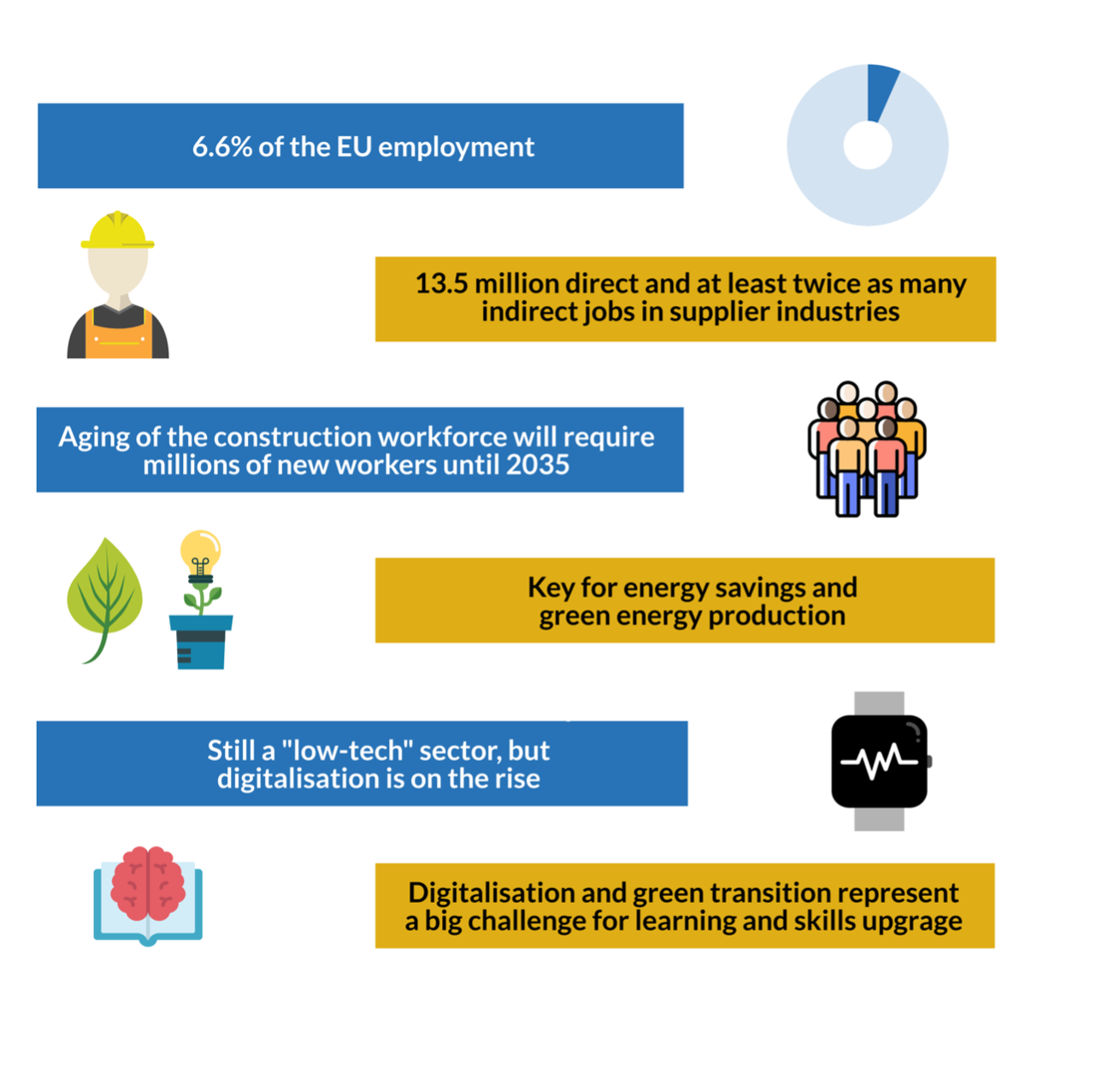Article | The currency of skills #2: Economic value

Article | The currency of skills #2: Economic value
As part of the ARISE Article series, the project addresses in this article the values of skills in the design and construction of qualified workers in society and as individuals. It also delves into how skilled workers can contribute to economic growth and competitiveness in different sectors.
Authors:
Paul McCormack, Innovation Manager at Belfast Metropolitan College.
Dr. Veronika Schröpfer, Head of EU Research Projects at Architects' Council of Europe (ACE-CAE)
LinkedIn profile.
Larissa C. De Rosso, Project Officer at Architects' Council of Europe (ACE-CAE)
Editor:
Swapna Mimi Saha, Assiatant Project Officer at Architects' Council of Europe (ACE-CAE).
LinkedIn profile.

(Note: opinions in the articles are of the authors only and do not necessarily reflect the opinion of the EU).
The significance of having a relevant skill is crucial to enabling digital and green transitions, as highlighted by the European Year of Skills. It takes more than only formal education—that is, education received in schools and universities— to produce competent and informed professionals. It also heavily depends on knowledge gained in informal or non-formal settings, such as training, workshops, mentoring, Continuous Professional Development programmes and so on. Professionals can use validation, such as certifications, to show what abilities they have learned in these kind of situations. It makes getting credentials, getting into training, and getting into the workforce easier.
Moreover, skills have economic value both at the individual and societal levels. For individuals, acquiring and honing valuable skills could lead to better job prospects, thus resulting in higher income potential. Skilled workers tend to command higher wages and have greater bargaining power in the labour market. At this societal level, a skilled workforce is a driver of the personal contentment that they can bring, better societal standing if you stay in a job, and competitiveness. Countries that invest in developing the skills of their population can benefit from increased productivity, innovation, and overall economic development.
The importance of skills in the design and construction sector
Skills are the backbone of the construction industry, playing a vital role in ensuring efficient and high-quality project outcomes. Skilled workers possess the knowledge, expertise, and experience necessary to tackle the complex challenges that arise during construction projects. Their ability to troubleshoot issues, adapt to changes, and implement innovative solutions enhances overall productivity and efficiency. Moreover, skilled workers are crucial for maintaining safety standards on construction sites. Their expertise minimises the risk of accidents and ensures the well-being of all workers involved. Skilled craftsmen, for example, possess the necessary techniques and precision to carry out intricate tasks, reducing the likelihood of errors and rework. In the long run, this bridges the building performance gap and reduces maintenance costs. This figure shows the skills, needs, and challenges of the EU construction sector.

Figure 1: Skill needs and challenges in the EU Construction sector, CEDEFOP, 2023
In an industry where innovation adoption is growing, having the right set of skills is crucial for the new opportunities in the market. Skills not only ensure smoother project execution but also enhance the overall quality of work. Clients are increasingly seeking out construction companies that can offer specialised expertise, innovative solutions, and industry-leading skills. A skilled workforce brings a multitude of benefits to construction projects. Skilled professionals are more likely to deliver projects on time and within budget, minimising delays and cost overruns. They possess the knowledge and experience to handle complex tasks and overcome challenges efficiently. Additionally, a skilled workforce contributes to improved safety standards, reducing the risk of accidents and injuries on construction sites. To stay competitive, construction companies must invest in their employees’ skills. This includes providing opportunities for training and development, encouraging continuous learning, and fostering a culture of innovation. By prioritising skill development, construction companies can not only attract clients but also retain top talent in an industry known for its high turnover rates.
Evolution of skills in the construction industry
The construction industry has witnessed a significant evolution in the skills required to meet the demands of modern projects. Traditionally, construction skills were centred around manual labour and basic technical knowledge. However, with advancements in technology and the increasing complexity of construction projects, the skill set required has expanded.
Today, construction professionals need to be proficient in a range of areas beyond traditional construction techniques. Digital literacy, including the ability to use construction software and new methods including BIM (Building Information Modelling), has become essential. Additionally, skills in project management, communication, problem-solving, and sustainability are now highly sought after.
The industry's shift towards sustainable construction practices has also influenced the skills required. From understanding green building principles to implementing energy-efficient solutions, construction professionals must adapt to meet the growing demand for environmentally conscious projects.
Educational attainment
Education and the attainment of skills have a big impact on both social inclusion and economic well-being. High-quality learning is strongly linked with higher earnings and greater employment opportunities. In financial terms, education and skills policy are hugely important, and increasingly so. Skills provide an economic ladder for individuals; they offer opportunities to attain greater economic rewards for the individual. This is the same for employers: the greater the skills of their workforce, the greater the economic opportunity for the company, especially in high-value contracts requiring highly skilled individuals. High skill attainment is a crucial factor in enhancing international competitiveness and creating the right climate for sustained economic growth.
The figure below shows the current status of basic digital skills in EU Member States.

Figure 2: Digital skills in 2023: impact of education and age, Eurostat 2023
Education, training, and upskilling are among the top priorities in the policy areas of governments around the world. Skills are often viewed as essential elements in global economic competition. Skills and training are further considered key instruments for improving the economic standing of disadvantaged populations. It is crucial that skills and training are viewed as economic catalysts. Highly educated people are more productive. This is why they usually earn more and are more likely to be employed. Qualifications are clearly linked with earnings and employment for both men and women and across different age groups. Conversely, significant numbers of inadequately skilled workers represent an underutilised economic resource. In addition, it contributes to inequality because poorly skilled labour earns lower wages. Many countries view embedding economic principles into education and skills policies as a key instrument in creating a fair and equal society. Employability and career advancement skills are the specific abilities and attributes that individuals need to enhance their chances of securing employment, succeeding in their careers, and progressing professionally. These skills are highly valued by employers and can contribute to long-term career success.
It is important to note that the specific skills required vary vastly depending on the industry, job role, and organisational culture. It is critical, especially in today’s IT-enabled world, that skills are relevant and aligned to the desired career paths, highlighting opportunities to develop and showcase these skills through formal education, professional development programmes, internships, mentoring and practical experiences.
The figure European skills and jobs survey by CEDEFOP below shows the value/importance of the skills/qualifications at different levels of education.

Figure 3: Qualifications needed for job, European Skills & Jobs Surveys, CEDEFOP, 2023
Benefits of investing in skills development
Investing in skill development is a win-win situation for both individual professionals and the construction industry as a whole. For professionals, acquiring new skills or enhancing existing ones opens up a world of opportunities. Skilled workers often enjoy higher job satisfaction, increased career advancement prospects, and higher earning potential.
From an industry perspective, investing in skill development leads to improved project outcomes, reduced costs, and enhanced competitiveness. Construction companies that prioritise skills development gain a competitive advantage by offering high-quality services that meet the evolving needs of clients. Skilled workers contribute to increased productivity, reduced rework, and improved construction site safety, ultimately translating into higher profitability.
Moreover, investing in skills development helps address skill gaps and labour shortages that plague the construction industry. As older generations of skilled workers retire, there is a growing need to attract and develop new talent. By providing training and development opportunities, construction companies can bridge this gap and ensure a continuous supply of skilled workers.
Conclusions
In the dynamic landscape of the construction sector, skills have become the new currency that defines success. Gone are the days when projects were only evaluated based on their budget or completion time. Today, the focus has shifted to the expertise and capabilities of the workforce, with skills taking centre stage. From architects to engineers, project managers to labourers, the construction industry is recognising the immense value of a skilled workforce. The future of construction belongs to those who embrace lifelong learning, adapt to technological advancements, and possess a diverse skillset. By recognising the power of skills as a currency, professionals can shape the future of the construction sector and thrive in a rapidly changing industry.
In conclusion, the economic value of skills in the construction sector cannot be overstated. Skilled workers play a crucial role in driving growth, productivity, and success in the industry. Their expertise directly impacts project outcomes, client satisfaction, and overall profitability. To ensure a sustainable future for the construction industry, it is essential to invest in skill development. Construction companies, governments, and educational institutions must collaborate to attract, train, and retain skilled workers. By promoting the benefits of careers in construction, providing training opportunities, and continuously improving industry standards, the construction sector can secure a skilled workforce that will contribute to its long-term success. With skilled workers at the forefront, the construction industry will continue to meet the demands of a rapidly evolving world.
The ARISE project is developing a new methodology and revolutionising the skills exchange in the built environment. We also need to change how we view skills as a mechanism for harnessing the journey to success. We emphasise the importance of continuously investing in skill development to adapt to evolving market demands and achieve personal and professional success. We also encourage readers to embrace a lifelong learning mindset and leverage their diverse skill sets to thrive in a rapidly changing world.
References:
- European Year of Skills. [Online] 2020. [Cited: 08 March 2024.] https://year-of-skills.europa.eu/index_en.
- CEDEFOP. The greening of the EU construction sector: Skills intelligence data insight (2021 update). [Online] 11 April 2023. [Cited: 11 March 2024.] https://www.cedefop.europa.eu/en/data-insights/greening-eu-construction-sector.
- Eurostat. Digital skills in 2023: impact of education and age (2023 update). [Online] 22 Feburary 2023. [Cited: 11 March 2024.] https://ec.europa.eu/eurostat/en/web/products-eurostat-news/w/ddn-20240222-1
- CEDEFOP, European skills and jobs survey. Qualifications needed for job (2021 update). [Online]. [Cited: 08 March 2024.] https://www.cedefop.europa.eu/en/tools/european-skills-jobs-survey/data/explorer?country=EU27&field12=A40&indicator=_ET135#8